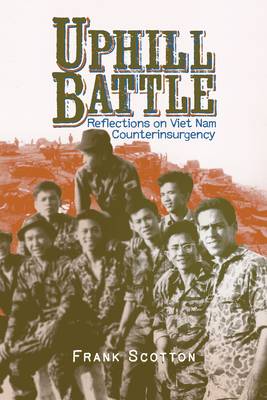
Door een staking bij bpost kan je online bestelling op dit moment iets langer onderweg zijn dan voorzien. Dringend iets nodig? Onze winkels ontvangen jou met open armen!
- Afhalen na 1 uur in een winkel met voorraad
- Gratis thuislevering in België vanaf € 30
- Ruim aanbod met 7 miljoen producten
Door een staking bij bpost kan je online bestelling op dit moment iets langer onderweg zijn dan voorzien. Dringend iets nodig? Onze winkels ontvangen jou met open armen!
- Afhalen na 1 uur in een winkel met voorraad
- Gratis thuislevering in België vanaf € 30
- Ruim aanbod met 7 miljoen producten
Zoeken
€ 55,45
+ 110 punten
Uitvoering
Omschrijving
When the Viet Nam War ended, with the United States of America defeated, many wondered how a military powerhouse lost to a "raggedy-ass, little fourth-rate country," as President Lyndon Johnson called North Viet Nam. Frank Scotton knew why. A young Foreign Service Officer assigned to Viet Nam in 1962, Scotton drove roads others avoided, walked trails alone, and spent nights in remote hamlets. Learning the Vietnamese language, carrying a carbine, and living out of a rucksack, he proved that small teams, correctly trained and led, could compete with communist units. In 1964, Scotton organized mobile platoons to emphasize political aspects of the conflict. Those special teams, adopted by the CIA, became models for the national pacification program. He prepared units in some provinces at the request of General Westmoreland, and in 1965 and 1966 worked with Special Forces. While organizational assistant and trouble-shooter for Robert Komer in 1967, and subsequently with William Colby in the military headquarters (MACV), Scotton reluctantly concluded that improved counter-insurgency techniques could not beat back the challenges posed by North Viet Nam resolve, lack of political energy in South Viet Nam, and the dissolving American commitment. For the first time Scotton shares his important observations and reasoned conclusions about the United States's involvement in the Viet Nam War.
Specificaties
Betrokkenen
- Auteur(s):
- Uitgeverij:
Inhoud
- Aantal bladzijden:
- 490
- Taal:
- Engels
- Reeks:
Eigenschappen
- Productcode (EAN):
- 9780896728677
- Verschijningsdatum:
- 14/07/2014
- Uitvoering:
- Paperback
- Formaat:
- Trade paperback (VS)
- Afmetingen:
- 150 mm x 226 mm
- Gewicht:
- 748 g

Alleen bij Standaard Boekhandel
+ 110 punten op je klantenkaart van Standaard Boekhandel
Beoordelingen
We publiceren alleen reviews die voldoen aan de voorwaarden voor reviews. Bekijk onze voorwaarden voor reviews.











